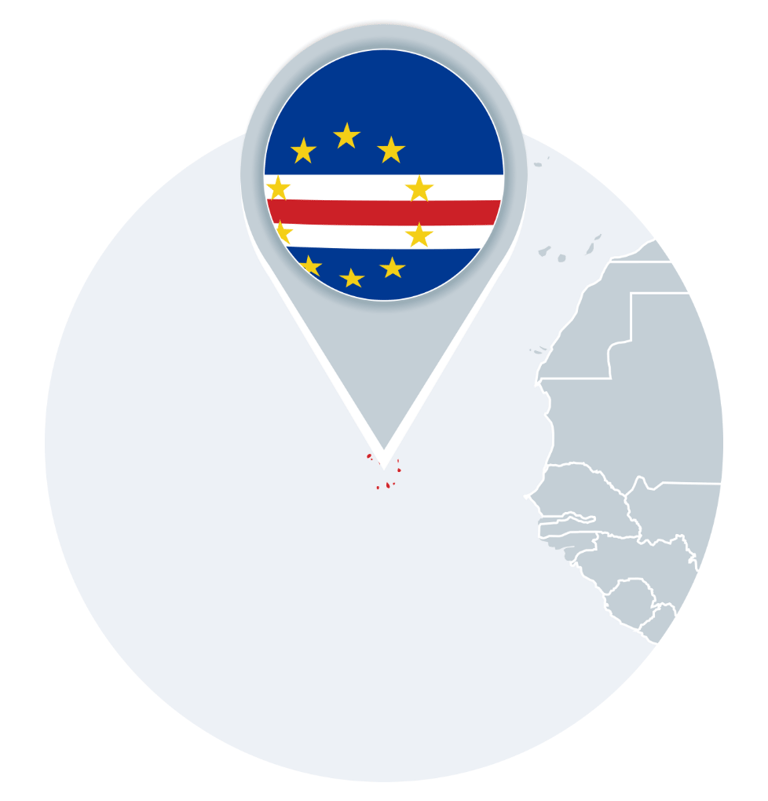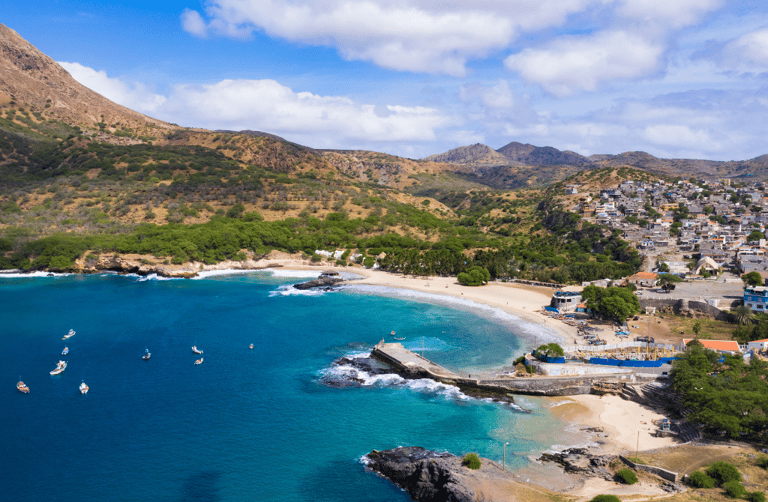cape verde
ARCHIPELAGO OF CULTURE
Find Cape Verde, a breathtaking sanctuary off the coast of West Africa in the Atlantic Ocean, a stunning archipelago comprising ten volcanic islands and five islets.
As you explore Cape Verde, you will encounter a diverse range of landscapes, from the lush valleys of Santo Antão to the dramatic volcanic peaks of Fogo. The islands’ unique geographical features provide a playground for outdoor enthusiasts.
The serene beaches of Sal and Boa Vista are perfect for relaxation and water sports, while the mountains and valleys of islands like Santiago and São Nicolau offer challenging hikes and spectacular views.



HISTORY
Cape Verde's history is an interesting fusion of exploration, colonization, and culture. The islands were uninhabited until the Portuguese discovered them in the 15th century.
They quickly became a crucial hub in the Atlantic slave trade due to their strategic location. The blend of African and Portuguese influences has shaped Cape Verdean culture, language, and traditions.
On the 5th of July, 1975, Cape Verde gained independence from Portugal, and since then, it has grown into a stable and progressive nation. Its history is celebrated in numerous museums, historical sites, and cultural festivals across the islands.


CULTURE
Cape Verdean culture is a colorful mix of African, Portuguese, and Brazilian influences. This pot is evident in the nation's music, dance, and cuisine.
Music is at the heart of Cape Verdean culture, with genres like morna, coladeira, funaná, and batuque captivating locals and visitors alike.
The people of Cape Verde are known for their warmth, friendliness, and laid-back lifestyle. The local Creole language, Kriolu, is widely spoken alongside Portuguese, the official language.
Traditional crafts, such as pottery, weaving, and embroidery, are also an essential part of Cape Verdean cultural heritage.

SAMPLE ITINERARIES
Archipelago of Heritage and Adventure


A Cape Verdean Escape
Explore the extraordinary islands of Cape Verde. Snorkel, lounge on a catamaran, enjoy local dishes, spend time kite surfing, interact with a local family.
Coming Soon...
Language: Portuguese is the official language, but Kriolu, a Creole language, is commonly spoken among locals.
Currency: The official currency is the Cape Verdean escudo (CVE). Euros are widely accepted, and ATMs are available in major towns and cities. You can convert your currency here.
Climate: Cape Verde enjoys a mild tropical climate, with temperatures ranging from 22°C to 29°C (72°F to 84°F) throughout the year. The best time to visit is during the dry season, from November to June.
Travel: The main international airports are Amílcar Cabral International Airport (SID) on Sal Island and Nelson Mandela International Airport (RAI) on Santiago Island. Inter-island travel is facilitated by domestic flights and ferry services.
Health and Safety: Cape Verde is considered a safe destination for travelers. It is advisable to drink bottled water and take necessary health precautions, such as up to date vaccinations for yellow fever and hepatitis A and B.
Cuisine: Cape Verdean cuisine is a delightful blend of African and Portuguese flavors. Seafood is a staple, with dishes like cachupa (a hearty stew) and pastel (fried pastry filled with fish) being popular. Be sure to try the local grogue, a sugarcane-based spirit.
Etiquette: Handshakes are common, often accompanied by a friendly pat on the back. Dress modestly, especially when visiting religious sites or rural areas. Swimwear is appropriate only at the beach or pool. Always ask for permission before taking photos of people. Respect any signage indicating photography restrictions.
Passport and Visa Information: Ensure your passport is valid for at least six months beyond your planned departure date. Citizens of the European Union, the United States, and many other countries do not require a visa for stays up to 30 days. However, it is recommended to check the latest visa requirements before traveling. Visitors staying longer than 30 days must apply for an extension at the local immigration office.
IMPORTANT THINGS TO KNOW

DISCOVER MORE
Need more information on specific packages and services?
Share your contact information and a dedicated Guest Experience Director will get in touch within 24 hours.





